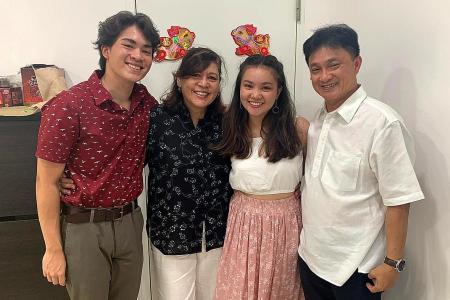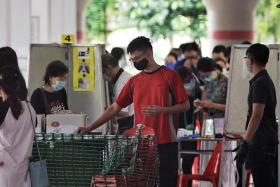Budget 2019: $6.1 billion to be set aside for Merdeka Generation
They played 'critical role' in nation's development, says Heng as he unveils Budget with goodies for most
At 19, she began working to support her mother after her father died from a heart attack in 1979 and left behind six children.
As the fifth child, Ms Barbara D'Cotta chose not to further her studies and joined a voluntary welfare organisation.
Some months, she would go without a salary, and when she was paid, it was just $220 a month, which covered her daily expenses and her mother's allowance.
Ms D'Cotta, who will turn 60 this year, is part of the Merdeka Generation (MG) born between 1950 and 1959.
Delivering his Budget in Parliament yesterday, Finance Minister Heng Swee Keat said that $6.1 billion will be set aside, most of it to subsidise healthcare for MG Singaporeans.
The Merdeka Generation Package (MGP), which will benefit nearly 500,000 Singaporeans, is part of a generous and forward-looking Budget aimed at building a caring, inclusive, safe and prosperous society.
The measures include helping Singaporeans cope with various expenses, including healthcare and education, and helping businesses and workers to thrive in a changing global landscape.
As part of Singapore's commemoration of its bicentennial this year, Mr Heng also unveiled two initiatives - a $200 million community fund to match charity donations and a $1.1 billion "Bicentennial Bonus".
In announcing the MGP, Mr Heng paid tribute to Ms D'Cotta and those in her generation who played a "critical role" in Singapore's development.
"The MG is a resilient and independent generation... They came together to forge our mul-ticultural, multiracial society," said Mr Heng, who was presenting his first Budget since he was named the designated successor to Prime Minister Lee Hsien Loong late last year.
Calling the MGP a "significant commitment by the Government", he said the package is a gesture of the nation's gratitude and a way of showing care for these seniors in their silver years.
Mr Heng said the $6.1 billion, with interest accumulated over time, will cover the full projected cost of more than $8 billion of the package, most of which will go towards easing the healthcare burdens of the generation.
MEDISAVE TOP-UP
As part of the package, the MG seniors will receive a Medisave top-up of $200 a year, from now to 2023.
Regardless of their income, they will also receive a lifetime of additional subsidies for outpatient care.
These special Community Health Assist Scheme (Chas) subsidies for common illnesses, chronic conditions and dental procedures will be higher than those for low-income Chas Blue card holders.
They will also enjoy 25 per cent off their subsidised bills at polyclinics and public specialist outpatient clinics.
Other perks include a lifetime of additional MediShield Life premium subsidies, starting at 5 per cent of their MediShield Life premiums and rising to 10 per cent after they turn 75.
A $1,500 additional participation incentive will also be given to MG seniors who join Careshield Life when it becomes available in 2021.
As this is on top of the $2,500 participation incentive for citizens born before 1960 announced last year, the total incentive for MG seniors will amount to $4,000.
Lastly, they will get a one-time $100 top-up to their PAssion Silver cards, which can be used to pay for activities and facilities at community clubs, public transport and more.
Those born in 1949 or earlier but missed out on the Pioneer Generation Package will also get the MGP benefits if they had obtained citizenship by 1996.
Ms D'Cotta met Mr Heng at the Merdeka Generation Tribute event earlier this month and spoke to him about her job as a specialised teacher for students with hearing loss at Mayflower Primary School.
She told The New Paper in a phone interview that the MGP is a boon for people of her generation who dropped out of school to work to support their families, and later stopped working to care for their children.
She stopped working from 2002 to 2012 to take care of her son, who had been diagnosed with dyslexia.
"I often think of how much more financially stable I would have been if I had got my degree earlier, or if I did not have to stop working for 10 years," she said.
"I don't have any chronic illnesses, but the thing with health is that illness could hit you at any time."
Ms D'Cotta feels honoured that her generation has been recognised for their contributions.
"I may not have contributed so much economically, but I believe that I have a talent with deaf children. Doing what I do best is how I can contribute to the country," she said.
READ MORE:
$1.1b Bicentennial Bonus includes cash payouts for the lower-income
Govt to set aside $3.1b more for long-term care, Chas subsidies
Govt boosts support for lower-wage, older workers
More being spent on eduction to give children a good start in life
What Singaporeans can get from Budget 2019
Finance Minister Heng Swee Keat delivered the Budget 2019 speech in Parliament yesterday. CHEOW SUE-ANN looks at what some of the main goodies are and who will benefit.

Get The New Paper on your phone with the free TNP app. Download from the Apple App Store or Google Play Store now




